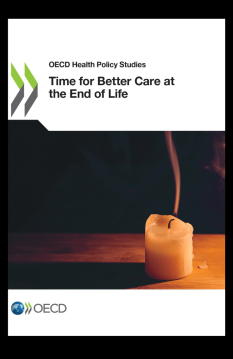OECD Health Policy Studies. 2023
This substantial 240-page report has the following key findings:
- Too many people receive sub-par care in their last days or months of life. Access to services is often insufficient and unequal, especially at home.
- Professionals often fail to discuss choices that provide people a dignified end of life, and their care preferences are rarely recorded.
- Care provided at the end of life often fails to alleviate people suffering and limit unnecessary treatments.
- Costs at the end of life are high for both the public purse and families, while not necessarily delivering quality of life, and there are questions about, which different care models could improve outcomes for patients while reducing costs.
- Putting end-of-life care higher in the policy agenda and implementing a more comprehensive set of policies would make the end of life a more meaningful and humane experience for people and their relatives, and improve the outcomes achieved for the resources invested.
Focusing on the last 12 months of life, and palliative care, it assembles a wide range of evidence and data around five points for assessing end-of-life care: whether it is accessible, people-centred, high quality, appropriately financed, and well-governed and evidence-based.
Rich in analysis and information, there is much information related to planning, including reference to Compassionate Communities, and a list of programmes (Annex 3.A.) to improve awareness and knowledge around end of life, e.g. in Australia, Iceland, Ireland, Korea, Luxembourg, Norway, Slovenia and the USA. The report notes, “Taboos around death, lack of conversations between health care professionals, patients and their close ones, and lack of funding are all recognised barriers to a wider spread of knowledge on end-of-life care.”

